(*Please read the follow-up post with additional information and ways to get your voice heard on this issue.)
I have recently been made aware of a change in the family size regulations for foster parents in Nebraska. Previously, it was acceptable to have up to six children under age 12. Now a foster family may only have four children under age 12. Previously, you could have 9 children under age 18 in a foster home. Now you may only have a total of 6 children. (These numbers include biological, adopted or foster children in the total number.)
This change in regulations is very upsetting to me. I know it is upsetting to many other foster parents, too. It keeps families who have four little kids from getting involved in foster care. It keeps families with three little kids from even being able to take a sibling group. Families with six kids are out of the game for good or at least until their children start leaving home. It makes placing siblings together that much harder and it makes it impossible for families like mine (we have 6 kids under age 12- three of them adopted from foster care) to foster any additional siblings of our children that may come into care.
I know many foster families will feel nervous expressing their frustration with these regulations. As foster parents, we understand that for the most part our voice doesn’t matter. The state makes the rules and our job is just to follow them. To express frustration is to risk losing a placement or falling out of favor with the people who license you. Those of us who love fostering and care about the children in our home may find that risk is too great. We choose silence in the hope that we can continue to care for the kids we love.
But I’m not in that position anymore. We have adopted all our foster children and now with these new regulations we will not likely be fostering again. Ever. This feels like a great loss for our family and for kids who need loving, stable homes. Silence is no longer an option.
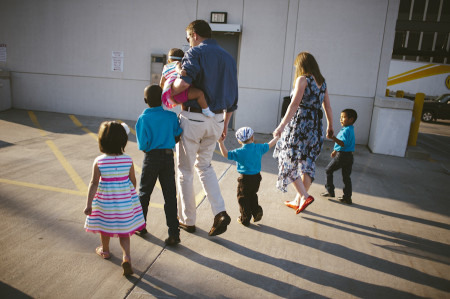
All photos by Love Equals Photography
My husband and I have spent our lives investing in children from crisis situations. We spent five years in group home work as houseparents to boys ages 6-18. Then after the adoption of our son, we became foster parents to infants. In total, we have spent 12 years working with 20 kids and their families. We believe this level of experience should be of value to the state of Nebraska.
We are not the same foster parents we were when we first started. We have learned how to be supportive of biological families instead of seeing them as the enemy. We have learned how to work effectively with DHHS caseworkers– giving them the information they need and sparing them from the obnoxious daily drama we’ve learned how to handle ourselves. We have developed relationships with attorneys, familiarity with the unique perspectives of the judges in our county, and an understanding of the value of organizations like CASA and the Foster Care Review Office. We now know what questions to ask before taking a placement so we don’t end up in a situation where a child will have to be bounced from our home. We know how to work with visitation providers to be sure a child’s schedule is respected, a parent has the hours they’re entitled to AND that children are being transported safely depending on their age. We have developed a supportive network of family, friends, and church community who understand what we’re doing, why we’re doing it, and can encourage us when it’s hard. We have learned our role in the foster care process– we know what our rights are, where we can have a voice and when we need to just let the process play out.
The bottom line is that we have become the kind of advocates foster children and their families need. And the only way we became those foster parents was through experience. The State of Nebraska is now losing many foster families like mine who have gained that hard-earned experience by caring for many kids, some of whom we ended up adopting. They are now going to be entrusting the care of sibling groups of four only to parents who have no children. Let that sink in for a minute. People with no parenting experience or who haven’t parented young children in the last 12 years will be taking on the care of large sibling groups of traumatized kids and all the unique needs that come along with them.
There are some childless couples who are up for that challenge! We were once those people and it was a crazy and beautiful introduction to parenting. But over the years we have realized how rare we were. Couples who aren’t able to have biological children don’t generally want to take on the uncertainty of fostering. They may be fostering with the intent (stated or not) to adopt, which can complicate relationships with the biological family. And if they do adopt those four children, they will now be unable to foster again and make use of the skills they learned in the process. This is a frustrating waste of the resources invested by the state and local agencies in training and licensing them when we create a whole category of “single use only” foster parents.
In a time where we are wanting to phase out the need for group homes and we are constantly putting out pleas for foster parents, I am thoroughly confused by this policy change. We need foster families. We need foster families that are experienced and understand the process. We need foster families that know how to care for kids from crisis situations and know what resources are available. What a gift to have foster parents who have relationships with teachers at the local school because they already have kids attending there or who have a good idea about what typical child development looks like because they have raised children before or have a relationship with a pediatrician who will be willing to take on this Medicaid child.
In all these considerations, I haven’t even begun to discuss one of the greatest strengths of my family. I believe a great healing gift we have to offer is the gift of siblings. When a new child enters our family, they are surrounded by siblings who get it. They have met biological families and understand the purpose of foster care (especially since a couple of them are former foster children themselves). They pray for the foster child and their family. They know about judges and physical therapists and home studies and caseworkers and visitation supervisors. I have watched my kids kiss a baby goodbye as she leaves for a visit and whisper to her, “I remember my visits, too. Have fun with your mom. We’ll see you when you get back.” My kids have written notes and drawn pictures for the biological moms of their foster siblings to let them know the baby is doing great. They have snuggled babies, sung them songs, read them stories, and provided a normalcy for these kids that my husband and I alone couldn’t provide. I don’t see the fact that we are a large family as a weakness in our ability to care for foster kids, but as a strength.
The saddest moment for me when I heard about these new regulations was realizing that if they had been in place a year ago when our daughter was born, she wouldn’t have been placed with us. The State of Nebraska no longer believes that was a good idea. There should be no fifth babies in homes with children under 12. This breaks my heart.
Carolina has been loved well by her siblings. She has been treasured. And outside of her weekly hour in the church nursery, she is rarely out of my sight. And even in the church nursery she is watched over by siblings and friends. She has received so much love and attention (she is sitting on my lap as I write this). Her needs have been met. She is a joyful child who has developed perfectly on schedule. I can’t understand why The State of Nebraska thinks we wouldn’t be capable of meeting her needs and providing her with the kind of home where she would feel safe. Why would that opportunity be denied to other children like her? Children who desperately need a loving home for a little while or forever. They can absolutely be loved, cherished, seen, and cared for as a fifth child (I also speak from my experience as a fourth child in a family of five kids.). Or a sixth child. And in my opinion, even as a seventh or eighth child.
A family’s ability to competently care for children is not about a number. There are families that feel maxed out with two kids (as did the family who adopted Carolina’s older brother and chose not to take placement of her). There are families I wouldn’t trust with a foster child at all. Should large families receive a different level of scrutiny when they go through the process to become foster parents? I have no problem with that. There needs to be a way to determine if they are capable of meeting the needs of EVERY child in their family. They may need an extra level of education or additional questions in the home study process, but that doesn’t mean there aren’t large families who would be an asset to the foster care system. With this policy change I feel as though the state has bought into the negative stereotype of foster parents with large families– the kids are dirty, uncared for, the parents are stressed and the only reason there are so many kids is because the foster parents are in it for the money. Do those families exist? I’m sure they do. They need to be dealt with on an individual basis and there needs to be a realization that ONE child in that kind of home is too many. It’s not about the number of kids, it is about the foster parent’s ability to love, bond, and meet the needs of children.
Because the need for foster parents is great, I believe the state should be as flexible and welcoming as possible to potential foster families. We need to allow them to be screened out through the licensing and home study process if they are not qualified for this job. We need to value the special skill set parents in a large family posses and put a priority on keeping experienced, quality foster parents involved in the system (I recognize that “experienced” and “quality” are not always synonymous). I hope that the state will reevaluate this policy change and correct what I feel is a great loss for loving families and kids in need.
Sincerely,
Maralee Bradley
Mom to:
Joshua, age 8, adopted from Liberia
Daniel, age 6, adopted from foster care
Bethany, age 5, adopted from foster care
Joel, age 3, biological child
Carolina, age 16 months, adopted from foster care
Theodore, 5 months, biological child

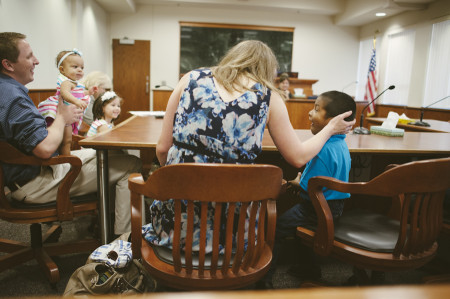
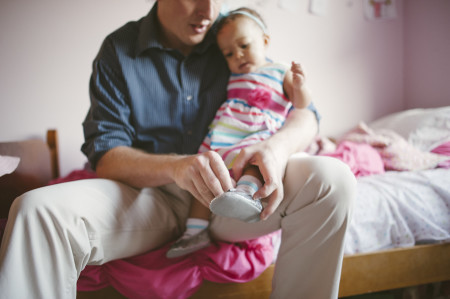
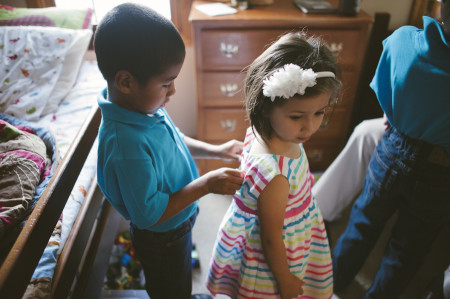
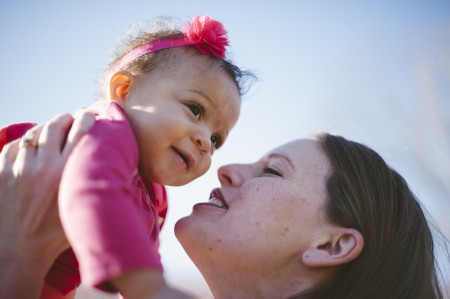
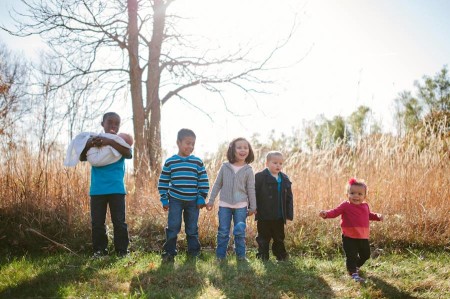
Pingback: Foster Family Size and a DHHS Response | A Musing Maralee
Pingback: Nebraska Foster Family Size Regulations and Public Hearing Details | A Musing Maralee